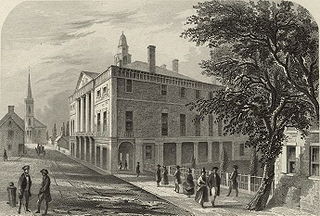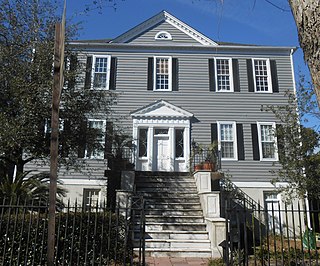Related Research Articles

Henry Middleton was a planter and public official from South Carolina. A member of the colonial legislature, during the American Revolution he attended the Continental Congress and served as that body's presiding officer for a few days in 1774. He left Congress before it declared independence. Back in South Carolina, he served as president of the provincial congress and senator in the newly created state government. After his capture by the British in 1780, he accepted defeat and returned to the status of a British subject until the end of the war.

Charles Pinckney was an American planter and politician who was a signer of the United States Constitution. He was elected and served as the 37th Governor of South Carolina, later serving two more non-consecutive terms. He also served as a US Senator and a member of the House of Representatives. He was first cousin once removed of fellow signer Charles Cotesworth Pinckney.

The 1st United States Congress, comprising the United States Senate and the United States House of Representatives, met from March 4, 1789, to March 4, 1791, during the first two years of George Washington's presidency, first at Federal Hall in New York City and later at Congress Hall in Philadelphia. With the initial meeting of the First Congress, the United States federal government officially began operations under the new frame of government established by the 1787 Constitution. The apportionment of seats in the House of Representatives was based on the provisions of Article I, Section 2, Clause 3 of the Constitution. Both chambers had a Pro-Administration majority. Twelve articles of amendment to the Constitution were passed by this Congress and sent to the states for ratification; the ten ratified as additions to the Constitution on December 15, 1791, are collectively known as the Bill of Rights, with an additional amendment ratified more than two centuries later to become the Twenty-seventh Amendment to the United States Constitution.

Rawlins Lowndes was an American lawyer, planter and politician who became involved in the patriot cause after election to South Carolina's legislature, although he opposed independence from Great Britain. Lowndes served as president/governor of South Carolina during the American Revolutionary War, and after the war opposed his state's ratification of the U.S. Constitution because it would restrict the trans-Atlantic slave trade. Lowndes also served as a state legislator and mayor of Charleston before his death. Two of his sons, Thomas and William Lowndes, would serve in the U.S. Congress.

William Loughton Smith was an American lawyer, politician, and diplomat from Charleston, South Carolina. He represented South Carolina in the United States House of Representatives from 1789 until 1797, during which time he served as chairman of the Committee on Ways and Means.
St. Michael's Churchyard, adjacent to historic St. Michael's Episcopal Church on the corner of Meeting and Broad Streets, in Charleston, South Carolina is the final resting place of some famous historical figures, including two signers of the Constitution of the United States. The church was established in 1751 as the second Anglican parish in Charleston, South Carolina.
Arthur Peronneau Hayne was a United States Senator from South Carolina who belonged to the Democratic Party.
The Moors Sundry Act of 1790 was a 1790 advisory resolution passed by South Carolina House of Representatives, clarifying the status of free subjects of the Sultan of Morocco, Mohammed ben Abdallah. The resolution offered the opinion that free citizens of Morocco were not subject to laws governing blacks and slaves.

John Faucheraud Grimké was an American jurist who served as Associate justice and Senior Associate Justice of South Carolina's Court of Common Pleas and General Sessions from 1783 until his death. He also served in the South Carolina state legislature from 1782 until 1790. He was intendant (mayor) of Charleston, South Carolina, for two terms, from 1786 to 1788.

John Rutledge was an American politician and jurist who served as one of the original Associate Justices of the Supreme Court and as its second Chief Justice. Additionally, he served as the first President of South Carolina and later as its first governor after the Declaration of Independence.
The following is a timeline of the history of Charleston, South Carolina, USA.

Elias Horry was a lawyer, politician, businessman and plantation owner who twice served in the South Carolina General Assembly as well as the intendant (mayor) of Charleston, South Carolina, serving two terms from 1815 to 1817 and 1820 to 1821.

Daniel Stevens was the twenty-fourth intendant (mayor) of Charleston, South Carolina, serving from 1819 to 1820.

John Dawson Jr. was the sixteenth intendant (mayor) of Charleston, South Carolina, serving two terms from 1806 to 1808.

Thomas Rhett Smith was the twenty-first intendant (mayor) of Charleston, South Carolina, serving from 1813 to March 1815.
John Bee Holmes was the seventh intendant (mayor) of Charleston, South Carolina, serving one term between 1794 and 1795.

Thomas Winstanley was the eighteenth intendant (mayor) of Charleston, South Carolina, serving one term between 1804 and 1805. He had been elected as a warden for Charleston on September 23, 1801. On October 5, 1803, he was elected intendant pro tem during the absence of the intendant.

James Reid Pringle was the thirtieth intendant (mayor) of Charleston, South Carolina, serving one term from 1830 to 1831.
Thomas H. McCalla was the nineteenth intendant (mayor) of Charleston, South Carolina, serving two consecutive terms from 1810 to 1812.
References
- ↑ "City-Council". The City Gazette and Daily Advertiser. Charleston, South Carolina. September 21, 1790. p. 3. Retrieved January 29, 2014.
- ↑ "Thomas Jones (1742-1826)". Find a Grave. Retrieved January 29, 2014.
- ↑ "Thomas Jones". Halsey Map Project. Preservation Society of Charleston. Retrieved January 29, 2014.
| Preceded by Rawlins Lowndes | Mayor of Charleston, South Carolina 1789–1790 | Succeeded by Arnoldus Vanderhorst |